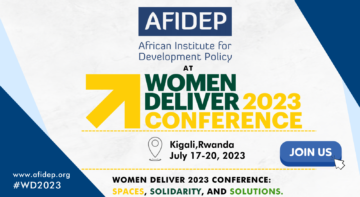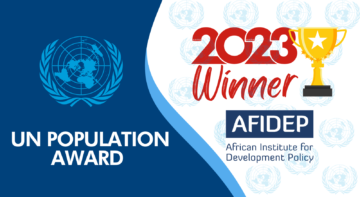News

On Wednesday May 3, 2017, AFIDEP’s Dr Eliya Zulu (Executive Director), Dr Rose Oronje (Director of Science Communication & Evidence Uptake), and Ms Nissily Mushani (Knowledge Translation Officer) held a briefing with Malawi’s Minister of Labour, Youth, Sports and Manpower Development, Mr Henry Musa.
The Minister requested for the briefing in order for him and his senior management team to get a better understanding of what Malawi needs to do to harness a sizeable demographic dividend. The Minister and his top officials were particularly keen to understand what the Ministry of Youth needs to do to steer the country’s efforts towards harnessing a sizeable demographic dividend.
The demographic dividend refers to the accelerated economic growth that is initiated by a rapid decline in fertility and mortality that results in a change in the age structure from one dominated by child dependents to one dominated by economically productive working adults.
The African Union has declared the demographic dividend as its theme for 2017, and Malawi’s President, Hon. Dr Peter Mutharika, is the UN Champion for demographic dividend in Africa. Malawi is therefore undertaking wide ranging activities to embrace the demographic dividend paradigm in its planning and resource allocation efforts in order to translate the commitments on the demographic dividend into action.
In the briefing, Dr Zulu outlined the four main things that Malawi, as well as other African countries, need to do in order to harness a sizeable demographic dividend.
Step 1: Conduct a demographic dividend profile study
Malawi has already conducted a demographic dividend profile study, which has outlined what the country’s prospects for harnessing the demographic dividend. The study recommended the need for Malawi to invest in interventions that reduce fertility to address its current high-child dependency burden, including increasing access to contraception, and keeping girls in school. Simultaneous interventions that need to go alongside reducing fertility include those interventions that: enhance education and skills development, improve the health of all Malawians, spur economic growth to create productive jobs, and improve governance and accountability.
Through the leadership of the Finance, Economic Planning and Development ministry, the country is currently conducting intensive dissemination of the results of the study at national and subnational levels in order to increase awareness as well as strengthen support and commitment at different leadership levels to implementing the dividend. AFIDEP led the conduct of this study under a partnership with the UNFPA.
Step 2: Develop a demographic dividend roadmap
Once countries understand their demographic dividend prospects, they need to develop a detailed roadmap that outlines what they will do in order to reap a sizable demographic dividend. This roadmap should identify the “game-changer’ interventions that countries need to undertake to realize a sizeable dividend. To be impactful, the interventions need to break away from “business as usual’ to identify what countries need to do differently for them to maximize on the dividend. As such, these interventions need to be informed by critical analyses of what countries have been doing, and things that need to change if countries are to transform their socio-economic prospects.
Malawi is already undertaking the development of its next five-year development plan, the third Malawi Growth and Development Strategy (MGDS III), and it is through this process that the country is defining its roadmap for the implementation of its demographic dividend commitments.
The African Union has developed a continental roadmap for harnessing the demographic dividend that countries could domesticate to their local contexts.
Step 3: Mainstream the demographic dividend in national annual development plans
The third step is to mainstream the demographic dividend into annual development plans and budgets. This will ensure that countries implement actions aimed at enabling them to harness a sizeable demographic dividend. Malawi will get to this step once it completes the development of the MGDS III.
Step 4: Implement, monitor, learn and evaluate
The final stage is implementing actions or programmes that will enable countries reap a demographic dividend. An important part of this is continuous monitoring and learning to enable programme improvement, and evaluation to assess effectiveness.
With this understanding the Minister wanted to know specific things that the Ministry of Youth should be doing in the short-term, medium-term and long-term. Dr. Zulu noted that except for broad recommendations contained in Malawi’s demographic dividend profile study report, we still do not know the game-changer interventions that the Ministry and other government agencies need to undertake. To identify these interventions, we need to conduct in-depth policy and programme analyses. He noted that he hopes the MGDS III will identify these interventions. He also noted that there were opportunities for the Ministry to work with AFIDEP and other researchers in conducting critical analyses that will identify specific interventions that the Ministry needs to undertake in addition to what will be identified by the MGDS III.
The meeting ended with the Minister recommending that AFIDEP holds further meetings with his technical team led by the Principal Secretary, Dr Luckie Sikwese, to chart way in which the Ministry will identify its game changer interventions that it needs to prioritise in efforts to enabling the country to harness a sizable demographic dividend.
Related Posts





